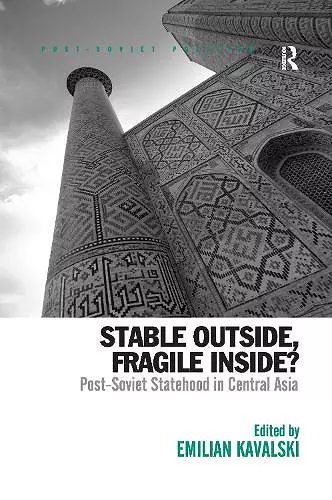Stable Outside, Fragile Inside?
Post-Soviet Statehood in Central Asia
Format:Paperback
Publisher:Taylor & Francis Ltd
Published:30th Nov '16
Currently unavailable, and unfortunately no date known when it will be back
This paperback is available in another edition too:
- Hardback£150.00(9780754676003)

In the wake of Soviet disintegration, Central Asia became an idiom for the ensuing confusion in the post-Cold War climate of international affairs, characterized by inter-state order and intra-state anarchy. Dynamic changes associated with the end of communism, the 'revival' of ethnic, religious and clan mobilization and the gradual involvement of various international actors, have inspired extensive scholarly and policy engagement with the region. Yet most analyses fail to bring Central Asia into the mainstream of systematic interrogation. This timely volume analyzes the quality of statehood in the region by assessing the complex dynamics of Central Asian state-making and focusing on the simultaneous patterns of socialization and internalization in the region. It straddles four different bodies of literature and addresses the systematic lacunae in all of them to investigate the localization effects of Russia, China, the EU and NATO on forms of post-Soviet statehood in Central Asia - placing Central Asia in the study and practice of world politics.
'This book successfully demonstrates that the experience of state-building should not be conceived teleologically as a civilizing process. Contextualizing the evolutionary experience of state-formation in Central Asia, the authors of this volume highlight, persuasively and shrewdly, that this region is increasingly subject to a paradox involving external stability and domestic fragility.' Marlene Laurelle, Johns Hopkins University, USA 'This collection of high-quality studies provides detailed overviews of relevant scholarship as well as a comprehensive introduction to selected empirical topics. It is thoroughly grounded in the theoretic academic literature that it impressively reviews, criticizes and extends on the basis of particular studies of the region on its own terms.' Robert M. Cutler, Carleton University, Canada 'This is one of the first books to try and analyse the region as a political whole. Because of the hopeless visa regimes which persist in Central Asia, it is almost impossible for one person to get to know all five countries intimately... This is therefore a very useful comparative analysis of five similar, but also very different, countries in what we think is a homogenous region...' Asian Affairs 'This volume is [...] welcome; the conversation it crystallizes is long overdue. Emilian Kavalski has assembled a group of top-notch Central Asia specialists, who contribute both empirical detail and theoretical value... each chapter is entirely worth reading on its own... Readers who know what questions to ask will benefit tremendously from reading this book. Others will read this volume differently, sticking to individual chapters and limiting their learning to what each independently provides. Either way, the book provides a tremendous service in generating a long-overdue conversation about weak statehood in the region - a topic that will remain relevant for the foreseeable future.' Acta Politica '... one will find insights in this work, especiall
ISBN: 9781138254367
Dimensions: unknown
Weight: 453g
252 pages